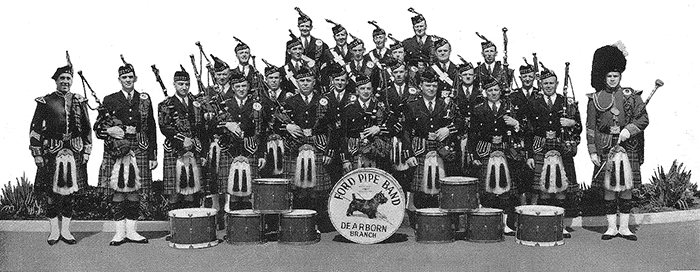
We are grateful to reader Steve Thomson from Dumbarton, but now resident in Detroit, Michigan, for alerting us to this previously unknown piece of pipe band history. The Ford band is pictured above in 1939. The story is from ‘The Henry Ford’ an innovation and history project. It reads:
If you’re out celebrating St. Patrick’s Day you’re sure to hear the sound of the bagpipes. In America, you’ll most likely hear the Scottish Highland pipes, not the Irish uilleann pipes, but over the years the Highland pipes have been assimilated into Irish culture and it’s hard to pass a St. Patrick’s Day celebration without hearing the familiar strain of the pipers.
And speaking of bagpipes, did you know Ford Motor Company sponsored its own pipe band in the 1930s and 1940s? Henry Ford was a lover of music, so it should come as no surprise that he sponsored a number of employee bands, one of which was a group of Scottish and Irish pipers and drummers.
The Ford Pipe Band, also known as the Ford Kiltie Band, was formed in 1932, with most of the members coming from the St. Andrew’s Pipe Band in Detroit. [The band is pictured below with the original caption to the photograph.]
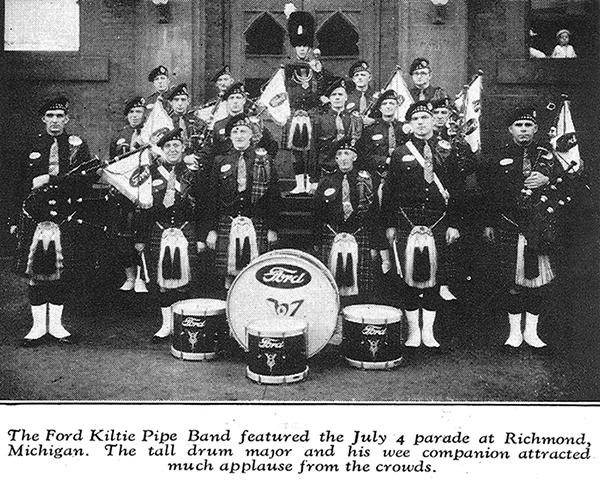
It started when Alexander Adams, the drum major, who was Edsel Ford’s bodyguard [Edsel Ford was Henry Ford’s only son and President of the company from 1919 until his death in 1943], began recruiting other members of the band to come work at Ford.
The Pipe Major, Hector McInnes, bass drummer, William Riddock, and pipers, James Cullen and Donald McPhee all worked in Plant Protection, with many of the other members working in departments across the company.
Ford sponsored the band and paid for all transportation and rooming, but the band had to pay for their own uniforms. Alec Bryce, one of the drummers, recalled that the band specially ordered their uniforms from Scotland and had them shipped to Ontario, bringing the uniforms into the U.S. piece by piece. A long process, but perhaps they decided it was worth the effort when the won Best Dressed Pipe Band at the Cowal Games in 1939.
Ford Motor Company provided members a practice space at the Highland Park plant, and gave the pipers and drummers paid time off for performances and competitions as well as credited work time for all travel.
The band consisted of first-rate musicians, many of the members had been regimental pipers and drummers in the Scots Guard during WWI and had continued to play in local bands in the Detroit area. During the peak of the band in 1934-36 as many as 20 pipers and drummers played for Ford Motor Company.
The band played all events and performances for free, and travelled across the United States and Canada for shows and competitions. They entertained Ford employees at the Ford Merit Club meetings, local parades, and other Ford events.
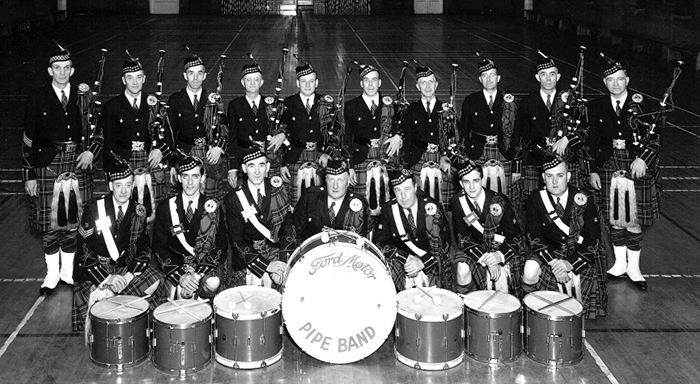
In addition to performances, the pipers and drummers were top-notch competitors being named North American Champion Bagpipe Band for 1934, 1935 and 1936, winning 15 silver cups in open competition during 1934 alone. They also won both the American and All-Canadian championships in 1939.
The band took a break during World War II, but some of the members reformed the group when the war was over to continue the piping tradition at Ford with a new set of musicians. The band played in their first post-war major competition in 1948 and continued to place well in competitions all over the United States and Canada. They also played at Ford and Lincoln-Mercury sponsored events, parades, and Scottish games.








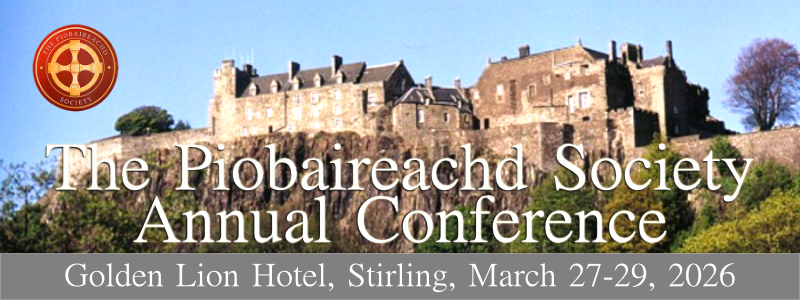

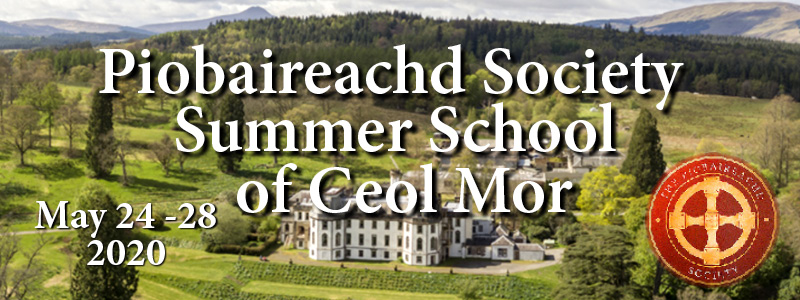





Does anyone know what Tartan the Detroit Band used?
I am originally from Detroit, MI of British Parents. I started learning the pipes under Pipe-Major (PM) Donald MacKinnon of the Essex & Kent Scottish Regiment (Militia) in Windsor, ONT as an 8-year-old when a friend of the family who was in the regiment would pick me up and would drive through the Detroit/Windsor Tunnel on a Saturday to lessons at the old Windsor Armoury. I later started learning under PM John Goodenow of the St. Andrew’s Society Pipe Band of Detroit and his Pipe SGTs (as I recall) Dale Brown and Dave Martin. My old Green Book actually was given to my Dad by a member of the Chrysler Pipe Band, unfortunately lost to history, when he was working on their office machines with Pitney Bowes. I also remember going to the St. Andrew’s Games on the BobLo Boat which was a fun way to get to the Island. I believe that The St. Andrews Society Pipe Band wore the Red Rose Tartan for Walter Rose.
Slainte,
Vince G.
My name is Danny Batchelor. My dad, Daniel senior, played pipes in the Chrysler Pipe Band for twenty years. He would take me to practices at Chrysler and if it was warm they would play outside on the roof. The St Andrew’s picnic was held at Bob Love Island and the band and dancers would be on the boat. My dad would play at the Detroit Lions half time show.
George Duncan became my teacher when I was about ten. He was a great teacher and the best piper. The Detroit Highlanders were sponsored by Scotties Fish & Chips. George Duncan was the Pipe Major; my dad played with them also. The Chrysler band played in many parades such as the Golden Jubilee and the Army Navy Day. Remembering these events seems like yesterday even though I am 85. I would like to know if Sandy McPhee was a left-handed piper? If so, I met him at George Duncan’s house in Detroit when I was there for a lesson. This is a little added info on the Detroit Highlanders pipe band. Walter Rose played in that band. He was responsible for start of the St Andrew’s Society Boys Pipe Band. He wrote a slow march Rose’s Dream. He also played at times with the Chrysler band
The Five Pipers (brothers – Marty, Scott, Tyge, Clifford, Dean) and One Highland Dancer (sister – Laura) were introduced to the world of highland piping and dancing by Scottish immigrants and family friends Donald and Jock MacLellan.
Donald MacLellan was one of the pipe majors for the Ford pipe band. Donald also piped with Shotts and Dykehead Caledonia Pipe Band before moving to the states.
My grandfather spoke of this band to me over the years. His said the band was formed after Henry Ford found out that rival auto companies had their own small pipe bands. Ford wanted the best group so he sent his people to Scotland to bring players back to start the band up and teach. The 4 players brought in were George Duncan , Donald MacPhee, Donald MacMillian and Hector MacInnes. All of being from the Outer Hebrides with George Duncan already living in New York. Duncan was the first PM thru the glory years Hector MacInnes being the poorest player of the 4 and was PM when the band was just performing as a local street band. Many of the top players broke away to form the very famous “Detroit Highlanders”.
That’s very interesting Stephen. I’d be very keen for more on the Detroit Highlanders. They must have been some bunch to inspire such a fine tune. RW
GREAT article! We have members of the St. Andrew’s Pipe Band at our Kilgour Scottish Cultural Centre. 2363 Rochester Road, Troy, MI 48083!
Thanks for this input, being from the south I enjoy reading the history of the Pipe bands. I saw pictures of s Pipe Band in S. Dakota early 1900’s; fascinated me.Hope our new generation here good. Luck on their Pipes and Drums success
I had met PM Hector MacInnes in his later years, as my first piping teacher was from Detroit. He was a very nice gentleman and I was told that he was quite a player even in his eighties when I had met him, though I never heard him play. Another side light is that my brother works for the Detroit Lions American Football team. I have been to their headquarters many a time and there is a huge picture of a halftime program at a 1930s football game where the pipe band is quite evident on the field.
Also if I am not mistaken, I believe that the Donald MacPhee mentioned in the early part of the article was the grandfather of Donald MacPhee the piper, reedmaker and RSPBA judge from the US now living in Scotland.
Thank you for posting Rab. There is a lot of rich piping history in the Detroit area, including bands like Ford, also a Chrysler pipe Band, and St. Andrews Society band. No doubt you’ll have some readers that also have connections and history of these bands and many well kent players that they might share.
best,
Steve T
Hello Steve. My name is Danny Batchelor. The only times I can recall that there were so many pipe bands. The Essex Scottish, Toronto Police, 48th Highlanders, 52nd Highlanders DeFasco, Chrysler, Toronto Scottish and so many more. It was like pipe band heaven for a short time. When we got home you had bagpipes in your ears for two days. We were lucky to travel with the Chrysler band to Canada for the Highland games at Fergus, Embro, Hamilton etc. Wonderful memories. Thanks for reminding me.